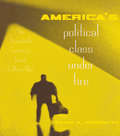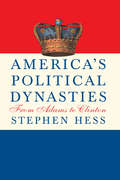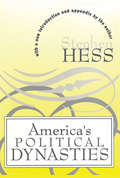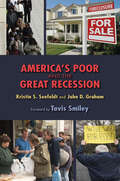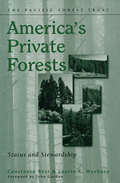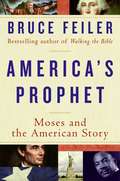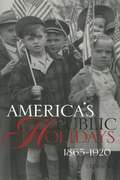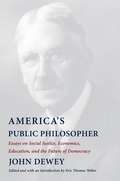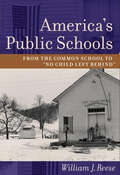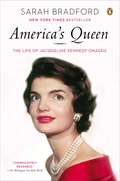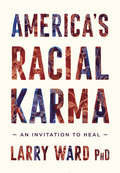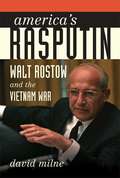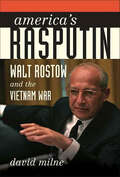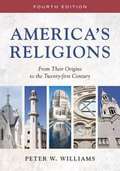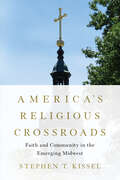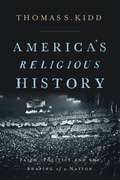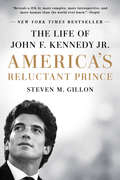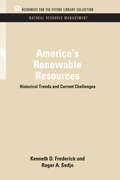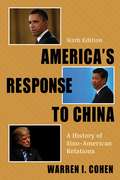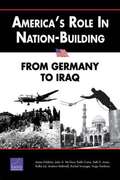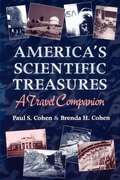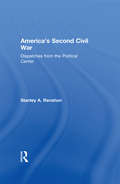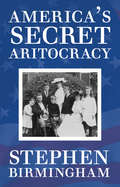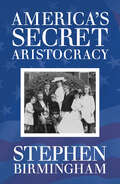- Table View
- List View
America's Political Class Under Fire: The Twentieth Century's Great Culture War
by David A. HorowitzFirst Published in 2003. Routledge is an imprint of Taylor & Francis, an informa company.
America's Political Dynasties
by Stephen HessThe Constitution states that "no title of nobility shall be granted by the United States," yet it seems political nobility is as American as apple pie.As Hess illustrates, while there always have been dynasties in America, they have not always been the same families: Dynasties are born and dynasties die, their rise and fall is part of the flux of a constantly changing political scene.America was founded in rebellion against nobility and inherited status. Yet from the start, dynastic families have been conspicuous in national politics. The Adamses. The Lodges. The Tafts. The Roosevelts. The Kennedys. And today the Bushes and the Clintons.Longtime presidential historian Stephen Hess offers an encyclopedic tour of the families that have loomed large over America's political history.Starting with John Adams, who served as the young nation's first vice president and earned the nickname "His Rotundity," Hess paints the portraits of the men and women who, by coincidence, connivance, or sheer sense of duty, have made up America's political elite. There are the well-known dynasties such as the Roosevelts and the Kennedys, and the names that live on only in history books, such as the Bayards (six generations of U.S. senators) and the Breckinridges (a vice president, two senators, and six representatives).Hess fills the pages of America's Political Dynasties with anecdotes and personality-filled stories of the families who have given the United States more than a fair share of its presidents, senators, governors, ambassadors, and cabinet members.This book also tells us the stories of the Bushes and what looks to be a political dynasty in waiting, the Clintons. Emblematic of America's growing diversity, Hess also examines how women, along with ethnic and racial minorities, have joined the ranks of dynastic political families.
America's Political Dynasties: From Adams To Clinton
by Stephen HessThis is the 30th anniversary edition of a book that was hailed on publication in 1966 as "fascinating" by Margaret L. Coit in the Saturday Review and as "masterly" by Henry F. Graff in the New York Times Book Review.The Constitution could not be more specific: "No title of nobility shall be granted by the United States." Yet, in over two centuries since these words were written, the American people, despite official disapproval, have chosen a political nobility. For generation after generation they have turned for leadership to certain families. They are America's political dynasties. Now, in the twentieth century, surprisingly, American political life seems to be largely peopled by those who qualify, in Stewart Alsop's phrase, as "People's Dukes." They are all around us Kennedys, Longs, Tafts, Roosevelts.Here is the panorama of America's political dynasties from colonial days to the present in fascinating profiles of sixteen of the leading families. Some, like the Roosevelts, have shown remarkable staying power. Others are all but forgotten, such as the Washburns, a family in which four sons of a bankrupt shopkeeper were elected to Congress from four different states. America's Political Dynasties investigates the roles of these families in shaping the nation and traces the whole pattern of political inheritance, which has been a little considered but unique and significant feature of American government and diplomacy. And in doing so, it also illuminates the lives and personalities of some two hundred often engaging, usually ambitious, sometimes brilliant, occasionally unscrupulous individuals.
America's Poor and the Great Recession
by John D. Graham Kristin S. Seefeldt&“A thorough and enlightening survey of the impact and legacy of the Great Recession on low-income Americans . . . accessible and readable.&” —Journal of American Studies Millions entered poverty as a result of the Great Recession&’s terrible toll of long-term unemployment. In this book, Kristin S. Seefeldt and John D. Graham examine recent trends in poverty and assess the performance of America&’s safety-net programs. They consider likely scenarios for future developments and conclude that the well-being of low-income Americans, particularly the working poor, the near poor, and the new poor, is at substantial risk despite economic recovery. &“[This] primer on the state of America&’s poor in the wake of the Great Recession of 2007 to 2009 cuts through Beltway theater and provides a clear picture of the magnitude of poverty of the United States as well as the patchwork nature of social services targeting the poor.&” —Journal of Policy Analysis and Management
America's Private Forests: Status And Stewardship
by John Gordon Laurie A. Wayburn Constance Best Pacific Forest TrustNearly 430 million acres of forests in the United States are privately owned, but the viability, and indeed the very existence, of these forests is increasingly threatened by population growth, sprawling urbanization, and patchwork development. Scientists, policymakers, and community leaders have begun to recognize the vital role of private forests in providing society with essential goods and services, from sustainable timber supplies to clean water. Yet despite the tremendous economic and ecological importance of private forests, information about their status and strategies for their protection have been in short supply.America's Private Forests addresses that shortcoming, presenting extensive data gathered from diverse sources and offering a concise overview of the current status of privately owned forests in the United States. As well as describing the state of private forests, the book sets forth detailed information on a wide range of approaches to conservation along with an action agenda for implementing those strategies likely to be most effective.Based on extensive research of existing literature as well as interviews and consultation with leading forestry and conservation experts, America's Private Forests is a unique sourcebook that offers a solid basis for discussion of threats to private forests along with an invaluable compendium of potential solutions. It will serve as an invaluable reference for those working to conserve and steward forest resources, including forest owners and their consultants, conservation organizations, and agency personnel, as well as researchers and students involved with issues of forestry, biodiversity, land use, and conservation.
America's Prophet
by Bruce FeilerThe exodus story is America's story. Moses is our real founding father. The pilgrims quoted his story. Franklin and Jefferson proposed he appear on the U.S. seal. Washington and Lincoln were called his incarnations. The Statue of Liberty and Superman were molded in his image. Martin Luther King, Jr., invoked him the night before he died. Ronald Reagan and Barack Obama cited him as inspiration. For four hundred years, one figure inspired more Americans than any other. His name is Moses. In this groundbreaking book, New York Times bestselling author Bruce Feiler travels through touchstones in American history and traces the biblical prophet's influence from the Mayflower through today. He visits the island where the pilgrims spent their first Sabbath, climbs the bell tower where the Liberty Bell was inscribed with a quote from Moses, retraces the Underground Railroad where "Go Down, Moses" was the national anthem of slaves, and dons the robe Charlton Heston wore in The Ten Commandments. "Even a cursory review of American history indicates that Moses has emboldened leaders of all stripes," Feiler writes, "patriot and loyalist, slave and master, Jew and Christian. Could the persistence of his story serve as a reminder of our shared national values? Could he serve as a unifying force in a disunifying time? If Moses could split the Red Sea, could he unsplit America?" One part adventure story, one part literary detective story, one part exploration of faith in contemporary life, America's Prophet takes readers through the landmarks of America's narrative--from Gettysburg to Selma, the Silver Screen to the Oval Office--to understand how Moses has shaped the nation's character. Meticulously researched and highly readable, America's Prophet is a thrilling, original work of history that will forever change how we view America, our faith, and our future.
America's Public Holidays
by Ellen M. LitwickiFrom the revered Memorial Day to the forgotten Lasties Day, America's Public Holidays is a timely and thoughtful analysis of how the civic culture of America has been fashioned. By analyzing how holidays became a forum for expressing patriotism, how public tradition has been invented, and how the definition of America itself was changed, Ellen Litwicki tells the intriguing story of the elite effort to create new holidays and the variety of responses from ordinary Americans.
America's Public Philosopher: Essays on Social Justice, Economics, Education, and the Future of Democracy
by John DeweyJohn Dewey was America’s greatest public philosopher. A prolific and influential writer for both scholarly and general audiences, he stands out for the remarkable breadth of his contributions. Dewey was a founder of a distinctly American philosophical tradition, pragmatism, and he spoke out widely on the most important questions of his day. He was a progressive thinker whose deep commitment to democracy led him to courageous stances on issues such as war, civil liberties, and racial, class, and gender inequalities.This book gathers the clearest and most powerful of Dewey’s public writings and shows how they continue to speak to the challenges we face today. An introductory essay and short introductions to each of the texts discuss the current relevance and significance of Dewey’s work and legacy. The book includes forty-six essays on topics such as democracy in the United States, political power, education, economic justice, science and society, and philosophy and culture. These essays inspire optimism for the possibility of a more humane public and political culture, in which citizens share in the pursuit of lifelong education through participation in democratic life. America’s Public Philosopher reveals John Dewey as a powerful example for scholars seeking to address a wider audience and a much-needed voice for all readers in search of intellectual and moral leadership.
America's Public Schools: From the Common School to "No Child Left Behind" (The American Moment)
by William J. ReeseIn this update to his landmark publication, William J. Reese offers a comprehensive examination of the trends, theories, and practices that have shaped America’s public schools over the last two centuries. Reese approaches this subject along two main lines of inquiry—education as a means for reforming society and ongoing reform within the schools themselves. He explores the roots of contemporary educational policies and places modern battles over curriculum, pedagogy, race relations, and academic standards in historical perspective.A thoroughly revised epilogue outlines the significant challenges to public school education within the last five years. Reese analyzes the shortcomings of "No Child Left Behind" and the continued disjuncture between actual school performance and the expectations of government officials. He discusses the intrusive role of corporations, economic models for enticing better teacher performance, the continued impact of conservatism, and the growth of home schooling and charter schools. Informed by a breadth of historical scholarship and based squarely on primary sources, this volume remains the standard text for future teachers and scholars of education.
America's Queen: The Life of Jacqueline Kennedy Onassis
by Sarah BradfordAcclaimed biographer Sarah Bradford explores the life of Jacqueline Kennedy Onassis, the woman who has captivated the public for more than five decades, in a definitive portrait that is both sympathetic and frank. With an extraordinary range of candid interviews--many with people who have never spoken in such depth on record before--Bradford offers new insights into the woman behind the public persona. She creates a coherent picture out of Jackie's tumultuous and cosmopolitan life--from the aristocratic milieu of Newport and East Hampton to the Greek isles, from political Washington to New York's publishing community. She probes Jackie's privileged upbringing, her highly public marriages, and her roles as mother and respected editor, and includes rare photos from private collections to create the most complete account yet written of this legendary life.
America's Queen: The Life of Jacqueline Kennedy Onassis
by Sarah BradfordAcclaimed biographer Sarah Bradford explores the life of Jacqueline Kennedy Onassis, the woman who has captivated the public for more than five decades, in a definitive portrait that is both sympathetic and frank. With an extraordinary range of candid interviews--many with people who have never spoken in such depth on record before--Bradford offers new insights into the woman behind the public persona. She creates a coherent picture out of Jackie's tumultuous and cosmopolitan life--from the aristocratic milieu of Newport and East Hampton to the Greek isles, from political Washington to New York's publishing community. She probes Jackie's privileged upbringing, her highly public marriages, and her roles as mother and respected editor, and includes rare photos from private collections to create the most complete account yet written of this legendary life.
America's Racial Karma: An Invitation to Heal
by Larry WardImmediate, illuminating, and hopeful: this is the key set of talks given by leading Zen Buddhist teacher Larry Ward, PhD, on breaking America's cycle of racial trauma."I am a drop in the ocean, but I'm also the ocean. I'm a drop in America, but I'm also America. Every pain, every confusion, every good and every bad and ugly of America is in me. And as I transform myself and heal and take care of myself, I'm very conscious that I'm healing and transforming and taking care of America. I say this for American cynics, but this is also true globally. It's for real." So says Zen Buddhist teacher Dr. Larry Ward.Shot at by the police as an 11-year-old child for playing baseball in the wrong spot, as an adult, Larry Ward experienced the trauma of having his home firebombed by racists. At Plum Village Monastery in France, the home in exile of his teacher, Vietnamese peace activist and Zen teacher Thich Nhat Hanh, Dr. Ward found a way to heal. In these short reflective essays, he offers his insights on the effects of racial constructs and answers the question: how do we free ourselves from our repeated cycles of anger, denial, bitterness, pain, fear, violence? Larry Ward looks at the causes and conditions that have led us to our current state and finds, hidden in the crisis, a profound opportunity to reinvent what it means to be a human being. This is an invitation to transform America's racial karma.
America's Rasputin: Walt Rostow and the Vietnam War
by David MilneWalt Rostow's meteoric rise to power -- from Flatbush, Brooklyn, to the West Wing of the White House -- seemed to capture the promise of the American dream. Hailing from humble origins, Rostow became an intellectual powerhouse: a professor of economic history at MIT and an influential foreign policy adviser to John F. Kennedy and Lyndon B. Johnson. Too influential, according to some. While Rostow inspired respect and affection, he also made some powerful enemies. Averell Harriman, one of America's most celebrated diplomats, described Rostow as "America's Rasputin" for the unsavory influence he exerted on presidential decision-making. Rostow was the first to advise Kennedy to send U.S. combat troops to South Vietnam and the first to recommend the bombing of North Vietnam. He framed a policy of military escalation, championed recklessly optimistic reporting, and then advised LBJ against pursuing a compromise peace with North Vietnam. David Milne examines one man's impact on the United States' worst-ever military defeat. It is a portrait of good intentions and fatal misjudgments. A true ideologue, Rostow believed that it is beholden upon the United States to democratize other nations and do "good," no matter what the cost. America's Rasputin explores the consequences of this idealistic but unyielding dogma.
America's Rasputin: Walt Rostow and the Vietnam War
by David MilneDavid Milne's America's Rasputin provides the first major study of the man who pushed two presidents into Vietnam.Walt Rostow's meteoric rise to power—from Flatbush, Brooklyn, to the West Wing of the White House—seemed to capture the promise of the American dream. Hailing from humble origins, Rostow became an intellectual powerhouse: a professor of economic history at MIT and an influential foreign policy adviser to John F. Kennedy and Lyndon B. Johnson. Too influential, according to some. While Rostow inspired respect and affection, he also made some powerful enemies. Averell Harriman, one of America's most celebrated diplomats, described Rostow as "America's Rasputin" for the unsavory influence he exerted on presidential decision-making. Rostow was the first to advise Kennedy to send U.S. combat troops to South Vietnam and the first to recommend the bombing of North Vietnam. He framed a policy of military escalation, championed recklessly optimistic reporting, and then advised LBJ against pursuing a compromise peace with North Vietnam. David Milne examines one man's impact on the United States' worst-ever military defeat. It is a portrait of good intentions and fatal misjudgments. A true ideologue, Rostow believed that it is beholden upon the United States to democratize other nations and do "good," no matter what the cost. America's Rasputin explores the consequences of this idealistic but unyielding dogma.
America's Religions: From Their Origins to the Twenty-first Century (3rd edition)
by Peter W. WilliamsIn this comprehensive survey, Williams offers concise descriptions of the background, beliefs, practices, and leaders of America's most influential and distinctive religious movements and denominations. Thoroughly revised and updated, this third edition of America's Religions incorporates the latest scholarship on religion and considers timely issues such as status of Muslims in the United States after September 11, 2001; the impact of religion on American politics, especially concerning the emergence of the Religious Right; and the intense battles fought within the Catholic Church and other denominations over the status of gay marriage and accusations of clergy members' sexual abuse. This edition also includes thirty-eight new illustrations of key persons in American religious history and notable places of worship.
America's Religious Crossroads: Faith and Community in the Emerging Midwest
by Stephen T. KisselBetween 1790 and 1850, waves of Anglo-Americans, African Americans, and European immigrants flooded the Old Northwest (modern-day Ohio, Indiana, Michigan, Illinois, and Wisconsin). They brought with them a mosaic of Christian religious belief. Stephen T. Kissel draws on a wealth of primary sources to examine the foundational role that organized religion played in shaping the social, cultural, and civic infrastructure of the region. As he shows, believers from both traditional denominations and religious utopian societies found fertile ground for religious unity and fervor. Able to influence settlement from the earliest days, organized religion integrated faith into local townscapes and civic identity while facilitating many of the Old Northwest's earliest advances in literacy, charitable public outreach, formal education, and social reform. Kissel also unearths fascinating stories of how faith influenced the bonds, networks, and relationships that allowed isolated western settlements to grow and evolve a distinct regional identity. Insightful and broad in scope, America’s Religious Crossroads illuminates the integral relationship between communal and spiritual growth in early Midwestern history.
America's Religious History: Faith, Politics, and the Shaping of a Nation
by Thomas S. KiddIn the post-9/11 world, it is not difficult to see how important religion remains in America and around the globe. An older generation of scholars expected that America and the rest of the Western world was headed inexorably toward secularization and the end of religion. America is undoubtedly secular in many ways, and our constitutional order requires a clear distinction between faith communities and government. Yet from the colonial era to the present, American men and women have been, and have remained, a pervasively religious people.In America's Religious History, leading historian Thomas S. Kidd traces the theological and ethnic diversity and enduring strength of American religion, with special attention to Christianity and evangelical faith. Interweaving religious history and key events from the larger narrative of American history, the book considers how faith commitments and categories have shaped the nation.Written with the student in mind, America's Religious History offers an up-to-date, narrative introduction useful for undergraduate and graduate-level courses on American religion. General readers wanting to better understand the religious background of American life and politics will also enjoy its engaging and insightful overview.
America's Reluctant Prince: The Life of John F. Kennedy Jr.
by Steven M. Gillon*A New York Times Bestseller*A major new biography of John F. Kennedy Jr. from a leading historian who was also a close friend, America&’s Reluctant Prince is a deeply researched, personal, surprising, and revealing portrait of the Kennedy heir the world lost too soon. Through the lens of their decades-long friendship and including exclusive interviews and details from previously classified documents, noted historian and New York Times bestselling author Steven M. Gillon examines John F. Kennedy Jr.&’s life and legacy from before his birth to the day he died. Gillon covers the highs, the lows, and the surprising incidents, viewpoints, and relationships that John never discussed publicly, revealing the full story behind JFK Jr.&’s complicated and rich life. In the end, Gillon proves that John&’s life was far more than another tragedy—rather, it&’s the true key to understanding both the Kennedy legacy and how America&’s first family continues to shape the world we live in today.
America's Renewable Resources: Historical Trends and Current Challenges (RFF Natural Resource Management Set)
by Roger A. Sedjo Kenneth D. FrederickBy recording one country's experience with its vast natural resource base, America's Renewable Resources: Historical Trends and Current Challenges will help to inform the management of future demands on the resource base in the U.S. and throughout the world. The contributors focus specifically on renewable resources--water, forests, rangeland, cropland and soils, and wildlife--which possess the capacity to restore themselves after they have be consumed. Because this capacity can be destroyed and the time required for restoration can be very long, a balance in their use is necessary to sustain continued productivity. In arresting fashion, the authors trace the history of each resource's use from early colonial times through periods of dramatic, sometimes cataclysmic, changes in its utilization by an expanding, diversifying society. They show how unforeseen consequences have forced social institutions into existence and compelled policy makers, especially at the federal level, to deal with problems for which they were largely unprepared. America's Renewable Resources, by examining changes in demand, technologies, policies, and institutions, will assist both policy makers and the public at large to look past short-term events to the conditions fundamental to maintaining our future economic and environmental wellbeing. Originally published in 1991
America's Response to China: A History of Sino-American Relations
by Warren I. CohenAmerica’s Response to China has long been the standard resource for a succinct, historically grounded assessment of an increasingly complicated relationship. Written by one of America’s leading diplomatic historians, this book analyzes the concerns and conceptions that have shaped U.S.–China policy and examines their far-reaching outcomes. Warren I. Cohen begins with the mercantile interests of the newly independent American colonies and discusses subsequent events up to 2018. For this sixth edition, Cohen adds an analysis of the policies of Barack Obama and extends his discussion of the Chinese–American relationship in the age of potential Chinese ascendance and the shrinking global influence of the United States, including the complications of the presidency of Donald Trump. Trenchant and insightful, America’s Response to China is critically important for understanding U.S.–China relations in the twenty-first century.
America's Role in Nation-Building: From Germany to Iraq
by James Dobbins Ian O. Lesser Peter ChalkThe post-World War II occupations of Germany and Japan set standards for post-conflict nation-building that have not since been matched. Only in recent years has the United States has felt the need to participate in similar transformations, but it is now facing one of the most challenging prospects since the 1940s: Iraq. The authors review seven case studies--Germany, Japan, Somalia, Haiti, Bosnia, Kosovo, and Afghanistan--and seek lessons about what worked well and what did not. Then, they examine the Iraq situation in light of these lessons. Success in Iraq will require an extensive commitment of financial, military, and political resources for a long time. The United States cannot afford to contemplate early exit strategies and cannot afford to leave the job half completed.
America's Scientific Treasures: A Travel Companion
by Paul S. Cohen Brenda H. CohenA fairly comprehensive travel guide that takes the reader to sites of scientific interest in the 48 contiguous states. Each state is represented by its own scientific treasures including museums, arboretums, zoos, national parks, planetariums, natural or technological points of interest and homes of famous scientists. Addresses, telephone numbers, travel directions, opening and closing dates, hours of entry, handicapped access, restaurants, fees, and the availability of tour guides is listed for each attraction.
America's Second Civil War: Dispatches from the Political Center
by Stanley A. Renshon"America has always taken a coherent national identity for granted. In recent decades that assumption has been challanged. Individual and group rights have expanded, eliciting acerbic debate about the legitimacy and limits of claims. National political leaders have preferred to finesse rather engage these controversies. At the same time, large numbers of new immigrants have dramatically made the United States more racially, ethnically, and culturally diverse. As a result this country faces critical political and cultural questions. What does it mean to be an American? What, if anything, binds our country and citizens together? Is a ""new American identity"" developing, and if so, what is it? Can political leaders help us answer these questions?For the second time in the history of the United States another civil war looms. Tthe new danger lies in conflicts among people of different racial, cultural, and ethnic heritages, and between those who view themselves as culturally, politically, and economically disadvantaged versus those whom they see as privileged. Unlike the first Civil War, the antagonists cannot take refuge in their family or their religious, social, cultural or political organizations. These are the precisely the places were the war is being fought. At issue is whether it is possible or desirable to preserve the strengths of a common heritage. Some quarters insist that our past has resulted in a culture only worth tearing down to build over, rather than one worth keeping and building upon.We are in conflict over the viability of American culture and identity itself.This volume is organized into a series of intellectually grounded but provocative chapters on political leadership, the 2000 presidential campaign. Immigration, affirmative action, and other contemporary social and political issues. Renshon uses the perspective of political psychology to help us to see old issues in new ways, and new issues in different ways. His critical questi"
America's Secret Aristocracy
by Stephen BirminghamAmerica's Secret Aristocracy is a report from inside the shush-shush inner circle of America's upper crust. Full of eccentric family members and well-sourced gossip, bestselling writer Stephen Birmingham spins an entertaining social history.
America's Secret Aristocracy: The Families that Built the United States
by Stephen BirminghamAn &“entertaining and perceptive&” history of America&’s most exclusive families, from the Brahmins of New England to the Grandees of California (The Washington Post). America has always been a constitutionally classless society, yet an American aristocracy emerged anyway—a private club whose members run in the same circles and observe the same unwritten rules. Here, renowned social historian Stephen Birmingham reveals the inner workings of this aristocracy. He identifies which families in which cities have always mattered, and how they&’ve defined America.America&’s Secret Aristocracy offers an inside look at the estates, marriages, and financial empires of America&’s most powerful families—from the Randolphs of Virginia and the Roosevelts of New York to the Carillos and Ortegas of California. With countless anecdotes about our nation&’s elite, including interviews with their modern-day descendants, Birmingham presents colorful portraits that capture the true definition, essence, and customs of America&’s aristocracy.
